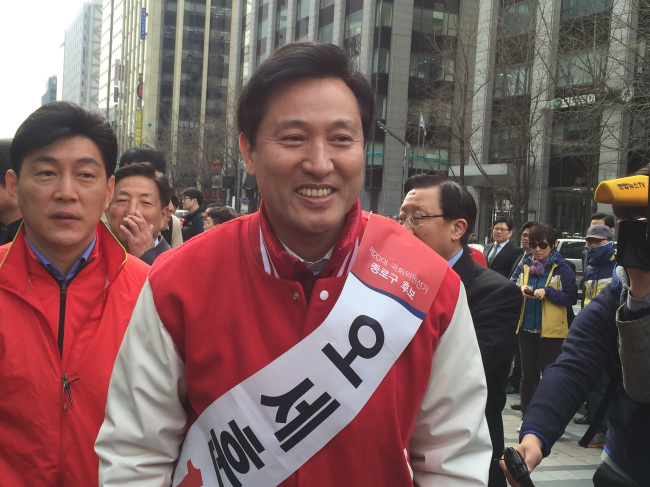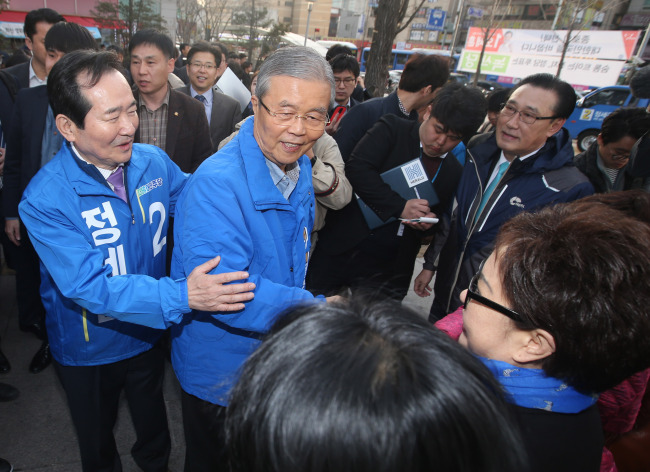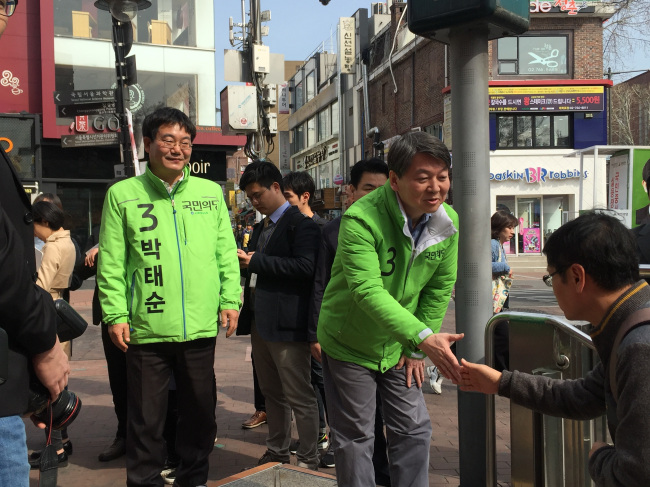Numerically speaking, Seoul’s northern Jongno-gu may be no more than just one of the 253 regional constituencies nationwide.
But its symbolic status — as the heart of the old capital and the current district of the presidential house — has always driven politicians to bet heavily on the area in key elections, as the outcome in the constituency often shows the political upper hand of the winning party.
It was here that leading parties chose to jump-start on Thursday their two-week campaign period, leading up to the April 13 parliamentary election.
Also, the way that party leaders treat their Jongno candidates largely show their respective political situations.
 |
| Saenuri Party candidate for Jongno-gu and former Seoul mayor Oh Se-hoon sets out on the campaign trail Thursday. Bae Hyun-jung/The Korea Herald |
Oh Se-hoon, candidate for the ruling conservative Saenuri Party and former Seoul mayor, announced the start of his election campaign by the Cheonggyecheon Stream, which cuts across Jongno-gu and neighboring Jung-gu.
The initiation ceremony, cohosted by Oh and the party’s Jung-gu candidate Ji Sang-wook, was considered a win-win strategy for the two who each have different political circumstances.
The urban stream of Cheonggyecheon, redeveloped by former Seoul Mayor and President Lee Myung-bak and refined by his successor Oh Se-hoon, is considered a major administrative achievement of the conservative camp.
Through his choice of location, Oh sought to remind the citizens of his mayoral career and to revive his former glory.
“I shall make the best use of my administrative experience as Seoul mayor, this time to improve Jongno,” read his campaign banners.
Ji, who is relatively more low profile, is more widely known as the husband of retired actress Shim Eun-ha. He has little to lose from his strategic union with Oh, a popular presidential aspirant on friendly terms with President Park Geun-hye. Despite his unrivaled lead in the polls, Ji has been striving to improve ties with the party’s pro-Park group, after winning in an in-party primary against former presidential spokesperson Kim Haeng.
Oh, should he wind up victorious in Jongno, will reinstate himself as a ranking party figure, breaking the long political pause since stepping down from his mayoral post in 2011 amid disputes over free school meals.
But due to such rising political leverage, he also received feeble support from party chairman Kim Moo-sung.
Much in contrast to his opposition counterparts, Kim neither showed up at the party’s Jongno campaign scenes, nor offered encouraging gestures to Oh upon their encounter at the Seoul National Cemetery earlier in the morning.
In a public survey conducted last week by local pollster Realmeter, the former mayor soared to No. 3 among presidential hopefuls with 13.8 percent in approval ratings, on the heels of Kim’s 14.4 percent.
 |
| The Minjoo Party of Korea chief Kim Chong-in (right) accompanies Rep. Chung Sye-kyun, running in Jongno-gu district, Thursday. (Yonhap) |
The Minjoo Party of Korea’s interim chief Kim Chong-in, on the other hand, spared no efforts in endorsing former party chief Rep. Chung Sye-kyun for his heavyweight match in Jongno.
“This April 13 election is about judging the Saenuri Party’s economic maladministration over the past eight years,” Kim said, while stumping for Chung during his early morning campaign at Dongmyo Station.
“As former Commerce Minister and economic expert, Chung will play a great role in solving the people’s pending economic hardships.”
Kim also stayed by Chung’s side throughout the party’s election campaign ceremony, confirming his support for the party’s key player.
Chung made a dramatic comeback in the 2012 general election for the then-Democratic United Party when he achieved a sweeping victory against a ranking pro-presidential aide in the symbolic Jongno. His commitment was taken as a risky self-sacrifice as he had given up his guaranteed win in his longtime constituency in North Jeolla Province upon the leadership’s call.
But with former mayor Oh now in the picture, the odds seem to turn against the opposition candidate.
Most local polls revealed last week that the incumbent representative Chung was falling behind Oh by a maximum of 11 percentage points.
“Years-long election experiences have taught me that one should never rely too much on public polls,” said Chung, shrugging off his supporters’ concerns.
“Having been here with the people for the past four years, I firmly feel and believe that the voter sentiment is on our side.”
He highlighted his favorable evaluation as having implemented 83.6 percent of his 2012 election pledges.
 |
| People’s Party cochairman Rep. Ahn Cheol-soo (right) shakes hands with a citizen while helping the campaign for the party’s Jongno-gu candidate Park Tae-soon on Thursday. Bae Hyun-jung/The Korea Herald |
The newborn centrist minority People’s Party, despite having lower chances of winning in Jongno, nevertheless paid significant attention to the district.
While campaigning in Hyehwa-dong, cochairman Ahn Cheol-soo volunteered to usher in and introduce passers-by to his party’s Jongno candidate Park Tae-soon. Citizens, excited to meet the former presidential candidate in person, did not hesitate to give Park well wishes.
“The Minjoo Party needs to tune its opinion (on opposition unity),” Ahn told reporters, reiterating his objection to the Minjoo-led unity talks.
“Former chief Moon speaks of party solidarity, yet current chief Kim says otherwise.”
The Minjoo candidate Chung has been repeatedly calling for a coalition of opposition parties for Jongno, to gather dispersed opposition votes and maximize the probability of government change.
By Bae Hyun-jung (tellme@heraldcorp.com)
South Korea will elect new National Assembly members in a general election on April 13. The Korea Herald is publishing a series of articles on candidate agendas, election trends and notable runners leading up to the race. This is the twelfth installment. -Ed

